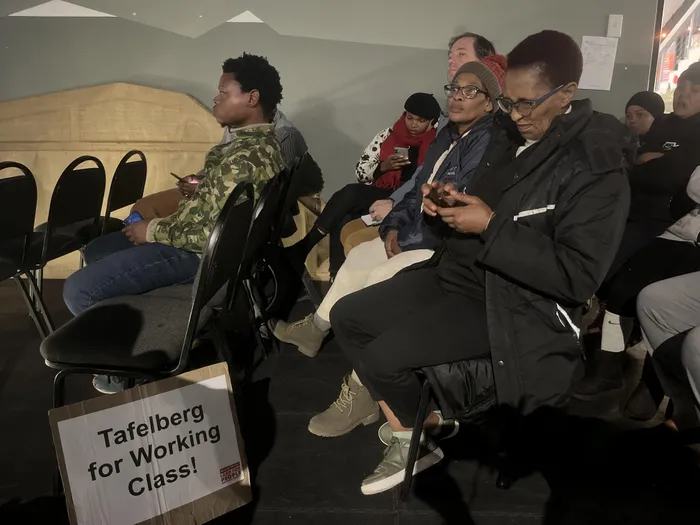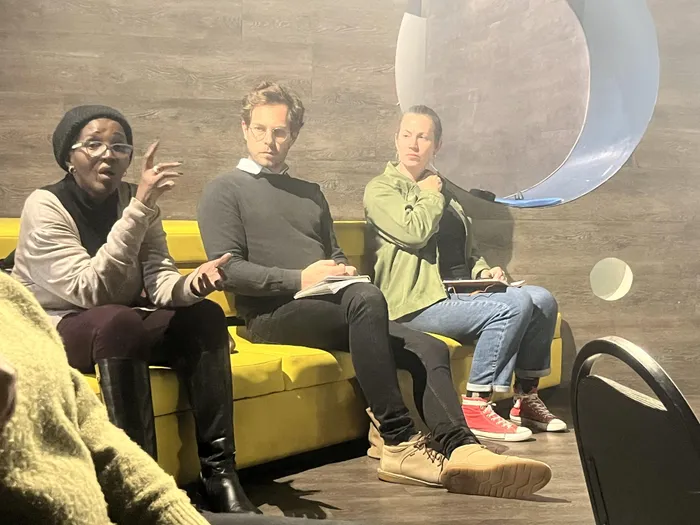Tafelberg site still a talking point

Pictured in front is Phakiso Mokwena, from Reclaim the City. From left, are Aphiwe Ngalo, Jens Horber, both from Ndifuna Ukwazi, Sheila Madikane and Tembeka Matomela, both from Reclaim the City.
Image: Fouzia Van Der Fort
The development of the Tafelberg school site, in Sea Point, is still a talking point, as various focus groups met to discuss and fine-tune their submissions for their particular interests.
The site at 353 Main Road, Sea Point, has been vacant for 15 years and just five-years ago the Western Cape Government’s (WCG’s) department of infrastructure (DOI) was mandated to develop a plan for spatial redress.
Three focus group discussions were hosted in recent weeks, since three conceptual plans were tabled on Saturday May 21. The development scenarios include open market, affordable and social housing, which interested parties can comment on.
The first focused stakeholder engagement session was held among surrounding residents and business owners at the Life Church Conference Centre, Sea Point, on Wednesday, June 11.
The Atlantic Sun attended the second focus group discussion with social justice, civic, advocacy and housing groups at the Life Church Conference Centre, Sea Point, on Tuesday, June 17; and the third focus group meeting on Wednesday, June 18, with businesses, ratepayers and property owners at the same venue.
The group discussions were hosted by DOI and its appointed professional service provider team, including engineers, architects and urban planners, from Zutari, who were flanked by specialist heritage advisors from Rennie, Scurr and Adendorff.
Rudolf Schroder, from Zutari, said that the presentation shared with all interested parties on May 21 had not yet been adapted following the focus group discussions and feedback due from the public by Monday June 30. It will be amended once all of the feedback has been captured from the focus groups.
According to Ndifuna Ukwazi (NU) Law Centre, the legal representatives of housing activists, in 2020, the Western Cape High Court overturned the Western Cape government's sale of the property in 2017. The court declared that the sale was unlawful and ordered the provincial government to develop a plan for spatial redress.
The Tafelberg site was previously used as a remedial school and for affordable state-rental housing.
Reclaim the City (RTC) activist Shiela Madikane, who is now living in the Helen Bowden building, across from Somerset Hospital, said at the meeting that the mention of heritage in Sea Point disturbed her.
Ms Madikane, who now lives in a building without water and electricity, grew up in Sea Point and has lived there her entire life. Ms Madikane said she had been evicted six times over the last 38 years.
“I was brought up and have worked in Sea Point all my life. I stayed in backyards in the domestic quarters, and I've never lived anywhere outside the peripheries,” she said.
Ms Madikane said the backyard of the school, where buses used to park, could be used to increase the number of affordable and social housing opportunities. She opted for more affordable and social housing opportunities on site.
NU researcher in urban planning Jens Horber addressed issues of safety and security with regards to the entry and exit points of proposed social housing opportunities.
He said that certain apartments were on the main road with easy access from the outside.
According to NU, the Tafelberg site has been empty for 15 years and there have been at least nine feasibility studies proving how social housing could be developed on the site, including one from the province itself and in 2013 the provincial department of human settlements asked to use the site to build affordable housing (“Tafelberg site up for ‘exploration process”, Atlantic Sun 2024).
Nathan Adriaanse, director of public information and stakeholder relations for the DOI, who chaired the second focus group meeting on Tuesday, said the potential aspirant homeowners had to be registered on the City of Cape Town’s housing waiting list.
Potential plans for the site can be viewed on www.westerncape.gov.za/infrastructure/353-main-sea-point.
He reiterated that the income of social housing, a state-subsidised, rental housing option, targeted at low-to-medium income households in South Africa, ranged from R1 850 and R22 000 per month.
Affordable housing in the province generally refers to housing options for households with a combined monthly income between R3 501 and R22 000, often described as the "gap market".

Western Cape Department of Infrastructure special programmes director Lindelwa Mabuntane, Pieter Louw and Ashleigh Florence-Brander, from Zutari urban designer.
Image: Fouzia Van Der Fort
Gordon Metz, a member of Sea Point Fresnaye Bantry Bay Ratepayers’ and Residents’ Association (SFBRRA), said he was at the meeting to collect information, which he would canvass with members.
He emphasised that while residents and people living in Sea Point were directly impacted or affected, the area was of interest to all in Cape Town ("SFB want holistic approach to development", Atlantic Sun 2024).
“It is an area that’s held dearly by all Capetonians. This is where they come on weekends. This is the road they walk down. This is where recreation and entertainment facilities are. It's by the beach. It is near the mountain,” he said.
Mr Metz said this development had the potential to shape the environment for more people to enjoy the area, whether positively or negatively. He lobbied for a precinct development approach and for the plans for the school building to be made public
Interested and affected parties are welcome to share their ideas, thoughts, and comments during the 30-day feedback period ending 30 June 2025. These submissions can be made by using the survey link by emailing 353onMain@westerncape.gov.za.